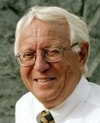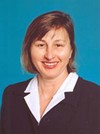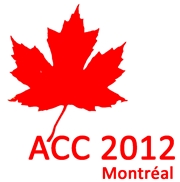|
ACC 2012 Plenary and Semi-Plenary Lectures
|
|
Plenary: Accomplishments and Prospects of Control
Karl Johan Åström, Lund University
Friday, June 29, 8:30-9:30am, Grand Salon / Marquette
Abstract:
There are many success stories and major achievements in control, something
remarkable for a field as young as 50 years. In this talk we will sample these
accomplishments and speculate about the future prospects of control. While there
are examples of feedback from ancient times, extensive use of feedback paralleled
industrialization: steam, electricity, communication, transportation etc. Control
was established as a field in the period 1940-1960, when the similarities of control
in widely different fields were recognized. Control constituted a paradigm shift
in engineering that cut across the traditional engineering disciplines: mechanical,
electrical, chemical, aerospace. A holistic view of control systems with a unified
theory emerged in the 1950s, triggered by military efforts during the Second World
War. The International Federation of Automatic Control (IFAC) was formed in
1956. Education in control spread rapidly to practically all engineering disciplines.
Conferences and journals also appeared. A second phase, driven by the space
race and the emergence of computers, started around 1960. Theory developed
dramatically as did industrial applications. A large number of sub-specialties
appeared and perhaps due to this, the holistic view of the field was lost. In my
opinion we are now entering a third phase driven by the ubiquitous use of control
and a strong interest in feedback and control among fellow scientists in physics and
biology. There are also new areas driven by networked systems, autonomy and safe
design of large complex systems. What will happen next depends largely on how we
respond to the new challenges and on how we manage to recapture the holistic view
of systems. Key issues will be education and interaction with other disciplines.
Biography:
Professor Karl Johan
Åström is Professor Emeritus of Automatic Control
at Lund University. Professor Åström's numerous recognitions
include: member of the Royal Swedish Academy of Sciences and
the Royal Swedish Academy of Engineering Sciences, a foreign
associate of the US National Academy of Engineering, the Rufus
Oldenburger Medal from ASME, the Quazza medal from IFAC, the
IEEE Control Systems Award, and the IEEE Medal of Honor "for
fundamental contributions to theory and applications of adaptive
control technology.
|

|
|
Aerospace Systems Keynote (semi-plenary):
Autonomous spacecraft control: from terrestrial to
planetary exploration missions
Jean de Lafontaine, NGC Aerospace Ltd
Wednesday, June 27, 8:30-9:30am, Grand Salon
Abstract:
Traditionally, the control of Earth satellites has relied and still relies on human
intelligence at the ground station instead of computer intelligence on-board the
spacecraft. Recent developments in powerful space-qualified microcomputers,
computer-aided software engineering tools and failure-detection-identification
techniques have displaced the equilibrium point in this trade-off toward more
autonomy. In this context, the European Space Agency (ESA) initiated in the 1990's
the PRoject for On-Board Autonomy (PROBA) with the objective of demonstrating
the benefits of on-board autonomy. The program also prepared the way for missions
where autonomy is essential, such as planetary exploration missions.
This presentation will describe recent developments in the autonomous guidance,
navigation and control (GNC) of space vehicles achieved through the PROBA
program. It will review the innovative work that enabled the migration of the GNC
functions from the ground control station to the spacecraft on-board computer,
leading to the concept of `satellite for the non-expert'. In addition to PROBA-1 and
PROBA-2 accomplishments, which have accumulated more than 12 years of flight
experience, the latest innovations in autonomous spacecraft control developed for
PROBA-V and PROBA-3, both under development, will be briefly reviewed. The
presentation will proceed with the recent extensions to the PROBA technology
for application to robotic planetary exploration missions where autonomy is an
enabling technology for Orbiter, Lander and Rover operations. The presentation will
conclude with a review of the benefits and drawbacks of spacecraft autonomy so far
observed via the PROBA program, and with an outlook on the remaining challenges
to be addressed.
Biography:
Jean de
Lafontaine is President and founder of NGC Aerospace Ltd, and Professor at the Université de
Sherbrooke. He graduated in engineering physics at the Royal Military College (Kingston, Canada) and obtained his PhD in
aerospace engineering at the University of Toronto. From 1982 to 1986, he worked for the Canadian Government on the
development of a military satellite project. From 1986 to 1996, he was employed with the European Space Agency (ESA) as a
satellite system engineer both at ESA and at the NASDA Tsukuba Space Centre near Tokyo (now JAXA). Jean returned to Canada
in 1996, became a professor at the electrical and computer engineering department of the Université de Sherbrooke and
founded his company NGC Aerospace Ltd. As the president of his flourishing company NGC Aerospace Ltd, Jean currently manages
a number of space projects with the European Space Agency, the Canadian Space Agency and various aerospace companies.
He also continues to teach control system theory as a professor at the Université de Sherbrooke. One of his many achievements
was the development of the flight code for the PROBA-1 spacecraft (launched in 2001), the first fully autonomous and
automatically-generated guidance, navigation and control software to be flown by the European Space Agency. The innovative
PROBA design philosophy has been extended to the PROBA-2 (launched in 2009), PROBA-V and PROBA-3 spacecraft as well as
planetary exploration vehicles to the Moon and Mars.
|

|
|
Power Systems Keynote (semi-plenary): Toward IT-enabled power systems:
large-scale distributed control for tomorrow's electricity grid
Marija D. Ilic, Carnegie Mellon University
Thursday, June 28, 8:30-9:30am, Grand Salon
Abstract:
This talk will describe a control-enabled framework for enabling deployment of
new hardware technologies (e.g., wind power plants, solar panels, responsive
demand, smart wires) into power systems. We explain how the proposed control
framework could evolve in synchrony with the existing utility control centers and
their supervisory control and data acquisition (SCADA) systems. Much greater
intelligence gets embedded into the new hardware technologies themselves for
managing temporal complexities and uncertainties in a distributed way. Today's
automation and control structure gets transformed into an interactive multi-
layered system with information and intelligence distributed within and among
the newly deployed hardware and SCADA applications. We describe how difficult
spatial complexities (such as voltage support of the grid) can be coordinated by the
SCADA system provided that it is not overwhelmed with managing inter-temporal
correlations in distributed resources.
We discuss how such a control-enabled approach could improve the performance
of different evolving power grid architectures. In particular, we show how carefully
architected automation enables electricity service at value and according to
choice. This is done while maintaining continuity of services defined according to
terms between service providers and users. We illustrate dynamic deployment of
wind and solar power, responsive demand, and plug-in hybrid electric vehicles,
according to the value they bring to those needing them. Applications to regulated
and restructured bulk power systems and to micro-grids are also outlined. These
examples will demonstrate how the overall operations and planning process
becomes much more manageable and simpler when enabled by the right control
and communication systems.
Biography:
Marija D. Ilic received her
Doctor of Science Degree in Systems Science at Washington University in
St. Louis, MO in 1980. She is currently a Professor at Carnegie Mellon University, Pittsburgh, PA, with a
joint appointment in the Electrical and Computer Engineering and Engineering and Public Policy
Departments. She is the Director of the Electric Energy Systems Group (EESG)
and the Director of the recently awarded SRC Smart Grid Research Center
at Carnegie Mellon University. She is also the Honorary Chaired Professor for Control of Future Electricity
Network Operations at Delft University of Technology in Delft, The Netherlands. She was an Assistant
Professor at Cornell University, Ithaca, NY, and tenured Associate Professor at the University of Illinois at
Urbana-Champaign. She was then a Senior Research Scientist in Department of Electrical Engineering and
Computer Science, Massachusetts Institute of Technology, Cambridge, from 1987 to 2002. She has 30
years of experience in teaching and research in the area of electrical power system modeling and control.
Her main interest is in the systems aspects of operations, planning, and economics of the electric power industry. She has co-authored several books in her field of interest. Prof. Ilic is an IEEE Fellow.
|

|
|
Semi-Plenary: Systems Nanotechnology: Identification, Estimation, and Control of
Nanoscale Systems
Richard D. Braatz, Massachusetts Institute of Technology
Wednesday, June 27, 8:30-9:30am, Duluth / Mackenzie
Abstract:
Nanometer length scale analogues of most traditional control elements, such
as sensors, actuators, and feedback controllers, have been enabled by recent
advancements in device manufacturing and fundamental materials research.
However, combining these new control elements in classical systems frameworks
remains elusive. Methods to address the new generation of systems issues
particular to nanoscale systems is termed here as systems nanotechnology. This
presentation discusses some promising control strategies and theories that have
been developed to address the challenges that arise in systems nanotechnology.
A selection of novel nanoscale devices are reviewed, selected by their potential for
broad application in nanoscale systems. Many of these devices use single-walled
carbon nanotubes, which demonstrate the diversity of potential applications for
a single type of nanoscale material. All of the elements necessary for the design
of advanced control systems are available, including sensors to rapidly assess the
physical characteristics and use for estimation of the states of a system, actuators
to affect the system states, and feedback controllers to utilize the state estimates to
determine the signals to send to the actuators to satisfy control objectives. Specific
examples are provided where the identification, estimation, and control of complex
nanoscale systems have been demonstrated in experimental implementations or
in high-fidelity simulations. Some control theory problems are also described that,
if resolved, would facilitate further applications. Some recent developments are
described for addressing a major challenge that must be resolved for commercial
manufacturing, which is improving the integration of nanoscale devices.
Biography:
Richard D. Braatz is the
Gilliland Professor at the Massachusetts Institute of Technology (MIT) where
he does research in control theory and its application to biomedical systems, pharmaceuticals manufacturing, and
nanotechnology. He received MS and PhD degrees from the California Institute of Technology and was a Professor at the
University of Illinois at Urbana-Champaign and a Visiting Scholar at Harvard University before moving to MIT. He has
consulted or collaborated with more than a dozen companies including IBM, United Technologies Corporation, Novartis,
and Abbott Laboratories. Honors include the AACC Donald P. Eckman Award, the Curtis W. McGraw Research Award from the
Engineering Research Council, the Antonio Ruberti Young Researcher Prize, and best paper awards from IEEE- and
IFAC-sponsored control journals. He is a Fellow of IEEE, IFAC, and the American Association for the Advancement of
Science.
|

|
|
Semi-Plenary: Control with stochastic components: How cells achieve homeostasis and exploit fluctuations
Hana El-Samad, University of California, San Francisco
Thursday, June 28, 8:30-9:30am, Duluth / Mackenzie
Abstract:
Cells are chemical reactors where reactions among molecules such as DNA, RNA,
and proteins implement the sophisticated programs that support life. Biological
molecules undergo thermal motion, and even when they have the propensity to
react together, they only do so probabilistically. Therefore, biological processes
are fundamentally stochastic because of the very nature of these probabilistic
biochemical reactions. This stochasticity, which manifests as cell to cell variability
in mRNA and protein levels even in clonal populations of genetically identical
cells, is accurately quantifiable with modern experimental techniques. In this
talk, I illustrate using a number of examples of how an iterative cycle of rigorous
computational modeling and quantitative experimentation can generate profound
insights into the control mechanisms used by cells to dampen or exploit their
stochastic fluctuations. I also discuss the challenges inherent in connecting
measurements of stochastic biochemical circuits to their modeling and analysis, and
highlight many exciting opportunities in this field.
Biography:
Hana El-Samad
is a faculty member in the department of Biochemistry and Biophysics at the University
of California, San Francisco and the California Institute for Quantitative Biosciences (QB3), where she holds the Grace
Boyer Junior Endowed Chair in Biophysics. She is a 2009 Packard Fellow, and was awarded the 2011 Donald. P Eckman Award.
Dr. El-Samad joined UCSF after obtaining a doctorate degree in Mechanical Engineering from the University of California,
Santa Barbara, preceded by a Masters Degree in Electrical Engineering from the Iowa State University. Dr. El-Samad's
research group emphasizes the role of control theory and dynamical systems in the study of biological networks. Her
research interests include the investigation of stress responses and biological stochastic phenomena, in addition to
the establishment of computational and technological infrastructures that allow for their quantitative probing in single
cells.
|

|
|
ACC 2012 Registration Site
Key dates
| Initial submissions due: |
Sept. 25, 2011 |
| Workshop proposals due: |
Oct. 31, 2011 |
| Acceptance/rejection: |
Jan. 31, 2012 |
| Final submissions due: |
Mar. 15, 2012 |
| Advance registration due: |
May 1, 2012 |
Gold Sponsors
Silver Sponsors
|





